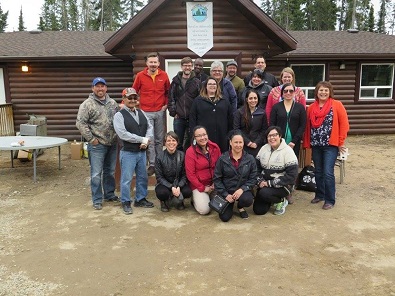The International Centre for Northern Governance and Development masters’ program’s stop in Montreal Lake in early May during the Centre’s last-ever field school in northern Saskatchewan. Photo courtesy @icngd, Facebook.
A centre focused on northern Saskatchewan research will permanently close in less than a month, with six staff losing their jobs and two master’s programs impacted.
The University of Saskatchewan had been looking for options on how to proceed with the centre, called the International Centre for Northern Governance and Development (ICNGD), and delivery of its two master’s programs after the province pulled the centre’s $1.1 million in targeted funding in the March budget.
The centre is comprised of a number of offices and teaching spaces at the U of S, and University vice-provost teaching and learning Patti McDougall said there is no current plan on what will happen with that space once the ICNGD ceases operations on June 15. At this time, it’s unknown whether staff will be able to find other roles in the university, McDougall said.
As for the master’s programs, all current students will be able to finish their degrees. In the future, the Masters of Northern Governance and Development (MNGD) will take no new applications for the 2017-18 academic year, while the Master’s of Governance and Entrepreneurship in Northern and Indigenous Areas (GENI) will continue taking new students in the fall.
However, the days are also numbered for the GENI, which is a joint program with the Arctic University of Norway.
“When we began this initiative with them (the Norwegian University) we had always talked about suspending intake in 18-19 to take stock of and take a look at what was being offered and whether the program was doing what it needed to for the students who were enrolled and for the people graduating and working in the field,” McDougall said.
In both cases, with the MNGD and with GENI, McDougall referred to these end dates as a “pause,” in order to find out whether the content being offered is desirable for northern students. She said, for example, it’s possible there’s a demand for a master’s of business administration in the north.
With current students GENI and MNGD students and those accepted into GENI in the fall, their programming will be absorbed into the Johnson-Shomoya Graduate School of Public Policy and delivered by staff there.
When asked about what will happen with the ICNGD’s current work with New North to create a northern Saskatchewan strategy, McDougall said she is unfamiliar with the project. She said, in general, when commitments have been made to research projects “we will always want to do whatever we can to honour those commitments.”
Overall, she said research being done by the U of S – through ICNGD and other faculties – will be analyzed by ICNGD’s Northern Advisory Board. Currently, she said the university is “assembling an inventory of all of our programming and all of our research and all of what I consider to be outreach, association, network-type activities.”
She said the university still plans to turn to the advisory board, comprised of industry, northern leaders, and others to “give advice on what they see the role to the University of Saskatchewan being going forward” in northern Saskatchewan.
MBC recently did a 3-part series on ICNGD. You can read those stories here.
